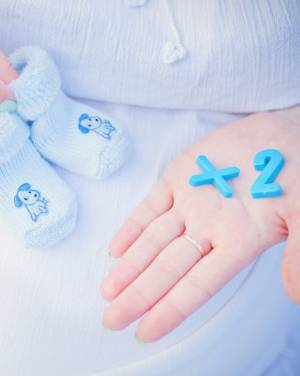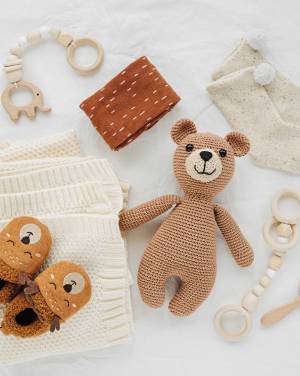What Kind of Help Can You Get When You Are Pregnant?
- When support from friends and family is limited, or other stress factors arise, many women long for local support during pregnancy and motherhood.
- Even when unsure about the pregnancy, knowing what is available can be helpful. This may open up new perspectives.
- Pregnant women and mothers have a right to support and help. Both state and non-profit organisations provide financial aid and practical assistance.
Childbirth classes, family nurses, support groups, baby gear, parenting helplines, baby banks... We have compiled a list of helpful resources and included the link to each organisation.
Do you have any questions or concerns? Write your message directly here ⬇️
General Points of Contact
Pregnancy Resource Centres, e.g. Life’s Community Support, offer services such as free baby supplies, parenting classes and peer support. They provide practical and emotional support to pregnant women over a wide range of areas, from assisting with finding appropriate accommodation to pregnancy-loss counselling. Furthermore, they can point you in the right direction for any other sources of help you may need.
- See our Financial Resources page for more information on benefits for pregnant women and families.
Baby Banks supply free baby items like nappies, formula and baby toiletries. Through a well-supported donation scheme, baby banks are also able to provide families in need with pre-loved items such as cots, prams, car seats, highchairs and toys. They provide material assistance not only for babies, but also for older children.
Midwives and Doulas
Your local GP will refer you to a midwife or a midwifery service, who will assume your maternity care and accompany you throughout your pregnancy. In addition to carrying out regular antenatal checks, your midwife is available to answer any questions or concerns you may have during pregnancy, whether these be related to physical changes or your mental and emotional well-being. If you wish to give birth at home, two NHS midwives will come to assist you during the birth. Alternatively, you can hire a private midwife, if it is important to you to be cared for by the same person throughout your pregnancy and birth.
Midwives also attend birthing women in hospitals and birth centres. There are some notable differences in the extent of the care offered by NHS vs private midwives. Remember to contact a GP or midwife as soon as possible, as one should ideally have the first appointment (called the booking appointment) before reaching 10 weeks LMP, in order to perform screening tests.
Some women may wish to enlist the help of a doula. Doulas provide emotional, non-medical birth support to women and their families. Their role is to advocate for the birthing woman and to ensure she remains informed throughout the birthing process. Especially in the absence of close female friends or relatives, the support afforded by a doula can help the woman feel safe and empowered during the birthing process.
The Doula Access Fund may help you pay for your doula expenses.
Early Days with Baby — Preparing for the Transition to Parenthood
Becoming a first-time mum can be a daunting experience, as you are in completely unchartered territory. However, there is support to be found as you adjust to life with a baby
- Family Nurse Partnership (FNP) is a home-visiting program for first-time mums under 24 years old. Your midwife can arrange this with your local FNP team. A specially-trained nurse will then visit with you and your family at regular intervals, starting at the beginning of your pregnancy, up until your child is between the ages of one and two. Your nurse will support you in preparing for birth and parenthood, as well as monitoring and assisting with breastfeeding, child development and your own mental health.
- Free Antenatal Classes help you prepare for the birth of your baby and the early days of parenting. This is also an opportunity to meet other expectant moms.
Postnatal Support
When becoming a (new) mum, childcare becomes a main focus. Routines need to adapt to the baby and the first weeks can feel like chaos until everything settles down. During this time and after, practical and informational support can be very helpful:
- Your midwife or health visitor will visit you at home in the first 10-14 days after birth to check on how you and the baby are managing.
- A housekeeper may alleviate you of household tasks, freeing up bonding time for you and baby. Expect to pay £10-£20 per hour.
- Nct Birth and Beyond Community Support provides support to new mums through a peer support service, particularly in the first 1,000 days. They offer courses, workshops, advice, meet-ups and second-hand sales, among other things.
- Gingerbread provides support to single parents through their helpline, job training, peer support, friendship groups and forums.
- The Parent Champions National Network provides information on how to access local family services. Volunteers assess an individual family’s needs and provide information on how to address these (e.g. appropriate nutrition, behavioural difficulties) or point them in the right direction for things like where to access financial support, employment and housing.
Childcare
- Childcare often becomes a consideration when returning to work or studies. In the UK, there are a number of childcare options available, both public and private. These include pre-school nurseries and crèches, childminders, after-school clubs, private nannies and au pairs, as well as community-run alternatives. Day nurseries provide care for children from birth to age five and are run by both private and public providers. Daycare costs between £210 and £280 per week, depending on where you live, for a full-time spot for a child under two. You may be able to obtain a subsidy for these costs.
- Preschool and nursery schools cater to children aged two or three, to five. They offer more structured learning in a classroom environment.
- A part-time nanny costs between £250 and £400 per week, and an au pair between £70 and £85 per week (plus room and board).
- A childminder, who is a registered childcare professional, offers daycare for preschool-age children in their own homes and costs about £70 per week.
💰 Check out our financial support page for payment options.
Other options include playgroups, which offer more informal play sessions, and a short break for parents, to children aged two to five. Private playgroups may charge a fee ranging from £5-20 per session. Free voluntary groups that are run by community centres and church-based groups are also available.
Finding Support in Community:
- Your Local NHS Trust offers support services to pregnant women and new mothers, including health and social care professionals, social workers and peer support.
- MOPS (Mothers of Preschoolers): an online platform to help you find support in your community and connect with other moms.
- Home-start helps you network with other moms and find a volunteer who would offer much-needed support.
- The Forum is a platform for young parents, learn from other mums and share your story.
Young parents
Minors and young parents who are studying, working or living unemployed in the UK are eligible for the following forms of government support:
- Care To Learn subsidises childcare and travel costs for mums under 20 who are studying at a publicly funded institution (e.g. a state school).
🤰🏻 Go to Teenage Mum to find out more. - Learner Support is available to young parents over 20 on a Further Education Course.
- Childcare Grants can be obtained by full-time students enrolled in Higher Education (e.g. university) and who have children under the age of 15.
🎓 For more information, see Pregnant at University.
Support in the Event of Illness or Disability
If you have a child with a disability, your local council will help pay for childcare. Working parents are eligible for a government subsidy of up to £4000 a year through the Tax-Free Childcare scheme to help pay for childcare for a disabled child. Support Groups are a beneficial way for parents of disabled children to connect and receive both practical and emotional support. Help can be drawn from various sources such as Portage, Child Development Centres and health visitors. Registering early for such services puts you at the advantage of having a support network in place by the time baby arrives.
If you are a parent-to-be with a disability or chronic illness, you can already contact your local social services team before your child is born, in order to ask for an assessment and plan support for your particular situation.
- See Raising a Special Needs Child for more on living with a child with a disability.
Keywords for More Support Options
In addition to the above-mentioned resources, there is a wide range of regional schemes and charities in place that offer support to new parents. Some of the following keywords, in combination with your place of residence, may help in your further online search:
- Volunteer Peer Supporter
- Community-Based Events
- Rent a Granny
- Postnatal Doula
- Mothers for Mothers
- Family Centres
- Live-out Nanny
Social media and NetMums also offer an easy way to connect, exchange information and find support.
You are worth all the support you can get!
Take care of yourself, mama. 💚
How Can I Succeed? — We Are Here for You!
You are probably dealing with multiple concerns right now — and long to see how everything could be made possible.
Maybe your pregnancy was unforeseen, and you are unsure whether to keep the baby. Perhaps you are concerned that this is more than you can handle. You are already doing what it takes by seeking solutions. You don't have to do this alone! They say it takes a village to raise a child; this village is available to you by accessing the sites listed above.
Perhaps lack of support is not your only concern. Are there more things going on? Allow us to be your sounding board as you address the issues that are weighing on you. Our digital resources are unbiased, free and easily accessible.
Get started by choosing one of our tests below and receive an immediate professional evaluation.
- 🤔 Could my symptoms be early signs of pregnancy?
- 👥 How does my personality affect my parenting style? Take the Personality Test
- ⛑ Where do I go from here? — Quick Answers Quiz
- 💻 Pregnant in the Workplace — Tips
- 🙎🏻♂️Acknowledging Paternity — How to navigate issues with the dad
- 💪🏻 Do I have what it takes? Strengths Finder Test





















